Ever wondered how to fit a gym into your mobile home without spending a lot? You’re not alone. With 91% of gym owners looking for ways to save space, setting up a DIY mobile home gym is a challenge and a chance. We’ll explore affordable fitness options to turn your small space into a health and wellness powerhouse.
Today, a home gym doesn’t need to be huge. It’s all about being efficient and versatile. In fact, 76% of people like equipment they can move around in their small gyms. This fits perfectly with mobile home remodel ideas that focus on being useful and affordable.
When setting up your budget-friendly fitness area, keep in mind that 82% of builders choose equipment that matches their workout style. Whether you like yoga, strength training, or cardio, there’s something for everyone. Options range from resistance bands to compact dumbbells, helping you create a gym that’s just right for you.
Ready to start your fitness journey without leaving home? Let’s see how to make the most of your mobile home and create a gym that keeps you motivated and fit. And we’ll do it all while staying within your budget.
Table of Contents
Key Takeaways
- 91% of gym owners prioritize space-saving solutions for small areas
- 76% prefer versatile, movable equipment for compact gyms
- 82% choose equipment based on their specific training needs
- Resistance bands, yoga mats, and kettlebells are essential for home gyms
- Budget-friendly options include shopping at discount stores and using bodyweight exercises
- Creating a dedicated workout space increases regular usage
- Mirrors are recommended to help maintain proper form during exercises
Understanding the Importance of Home Fitness
Home workouts are becoming more popular as a budget-friendly option. They offer convenience and privacy, saving money on gym memberships. Let’s look at the benefits and challenges of setting up a home gym in a mobile home.
Benefits of working out at home
Home fitness routines offer flexibility and save time on commuting. You can work out at your own pace without feeling judged. It’s also a great way to get your family involved in staying fit.
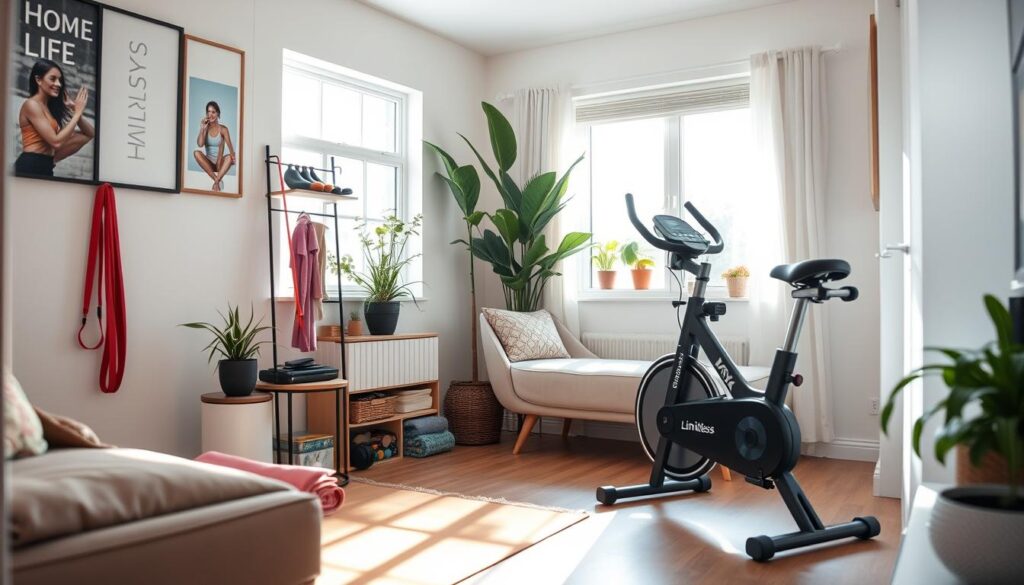
Overcoming space and budget constraints
Mobile homes often have limited space, but you can still create a functional gym. Focus on space-efficient exercises and compact equipment. Use resistance bands, adjustable dumbbells, and bodyweight exercises to make the most of your space.
| Budget | Equipment Options |
|---|---|
| £200 – £500 | Resistance bands, dumbbells, jump rope, stability ball |
| £500 – £1,500 | Adjustable weight bench, kettlebells, pull-up bar, power rack |
| £1,500+ | Treadmill, elliptical machine, multi-functional home gym station |
Setting realistic fitness goals
Set clear goals based on your space and resources. Whether you want to lose weight, build strength, or improve your heart health, choose the right equipment. A well-planned home gym can be just as effective as a commercial gym.
“The best home gym is the one you’ll actually use. Start small, focus on your goals, and gradually build your perfect workout space.”
Assessing Your Available Space in a Mobile Home
Creating a mobile home gym layout needs careful planning. We’ll look at how to make the most of your limited space for a great workout area.
Identifying Potential Workout Areas
Look for unused corners, alcoves, or spaces in your mobile home. These can be turned into workout zones. Even small areas can be used with the right approach.
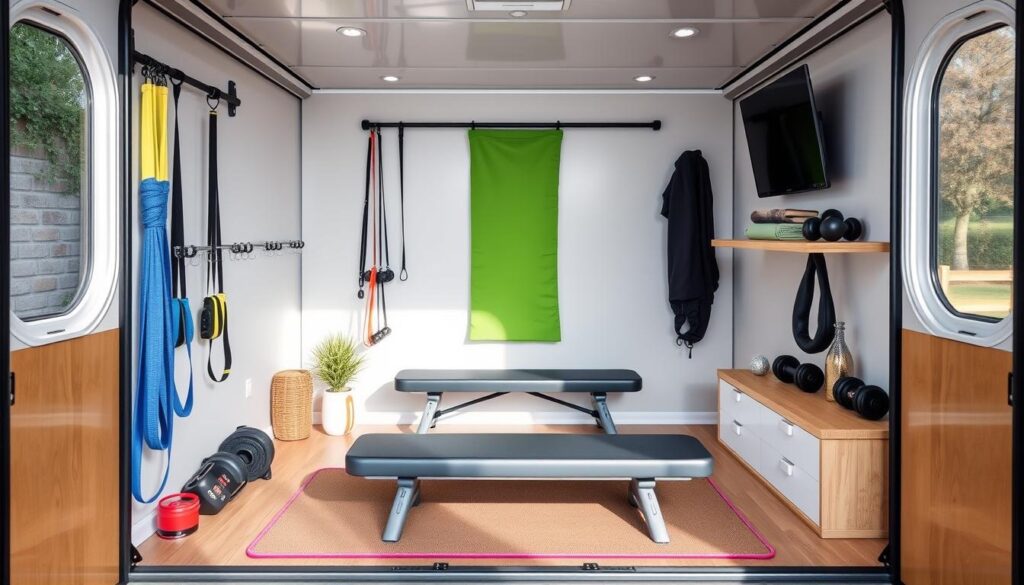
Measuring and Planning Your Gym Layout
Measure your floor space accurately. This helps choose the right equipment and plan an efficient layout. Pick multi-functional equipment to save space.
| Equipment | Space Requirement | Versatility |
|---|---|---|
| Adjustable Dumbbells | 2 sq ft | High (15 weight options) |
| Resistance Bands | 1 sq ft | Very High |
| Foldable Bench | 4 sq ft (in use) | Medium |
Maximizing Vertical Space for Equipment Storage
Vertical storage is crucial in mobile homes. Use wall-mounted racks, pegboards, or hanging organizers to keep your area tidy. This frees up floor space for exercises.
- Install wall-mounted shelves for smaller equipment
- Use door-hanging organizers for resistance bands
- Consider ceiling-mounted storage for larger items
A well-planned mobile home gym layout can be effective without costing a lot. With smart space-saving solutions and vertical storage, you can have a functional gym in a small mobile home.
Determining Your Fitness Needs and Goals
Creating a personalized fitness plan starts with understanding your unique needs and setting specific goals. When designing mobile home workouts, it’s crucial to assess your current fitness level. You should also define specific, measurable objectives.
Start by identifying the types of exercises you enjoy and those that align with your fitness goals. Whether you’re aiming for strength training, cardio, or flexibility, your mobile home gym should support these objectives.
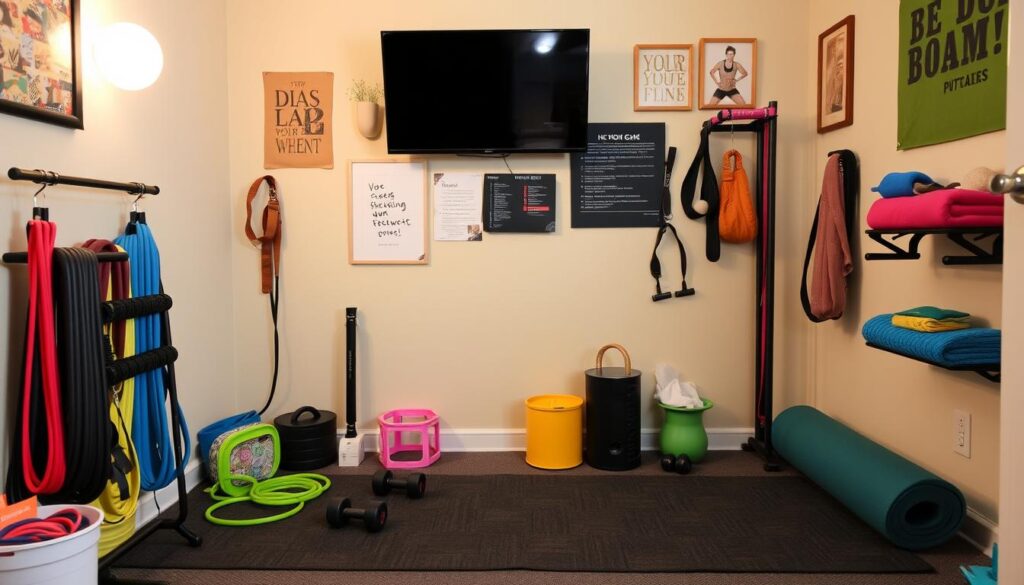
A survey revealed that 65% of people struggle to find time for the gym due to busy lifestyles. This makes home workouts an attractive option. When setting up your home gym, consider the following:
- Budget: Home gym costs range from $200 to $15,000
- Space: Opt for multi-functional equipment like adjustable dumbbells
- Goals: Choose equipment that supports your specific objectives
Interestingly, using adjustable dumbbells can save up to 70% compared to buying individual sets. For cardio enthusiasts, 40% prefer compact treadmills or exercise bikes in limited spaces like attics.
Remember, your personalized fitness plan should evolve with your progress. Regularly reassess your goals and adjust your mobile home workouts accordingly. This approach ensures long-term success and keeps your fitness journey engaging and effective.
Essential Equipment for a Budget-Friendly Mobile Home Gym
Setting up a home gym in a mobile home doesn’t have to cost a lot. With the right affordable gym equipment, you can create a great workout space without spending too much.
Resistance Bands: Your Versatile Workout Companion
Resistance bands are a key piece for any home gym. They cost from $12 and up, and they’re great for many exercises. They also don’t take up much space. You can find good deals at places like Five Below.
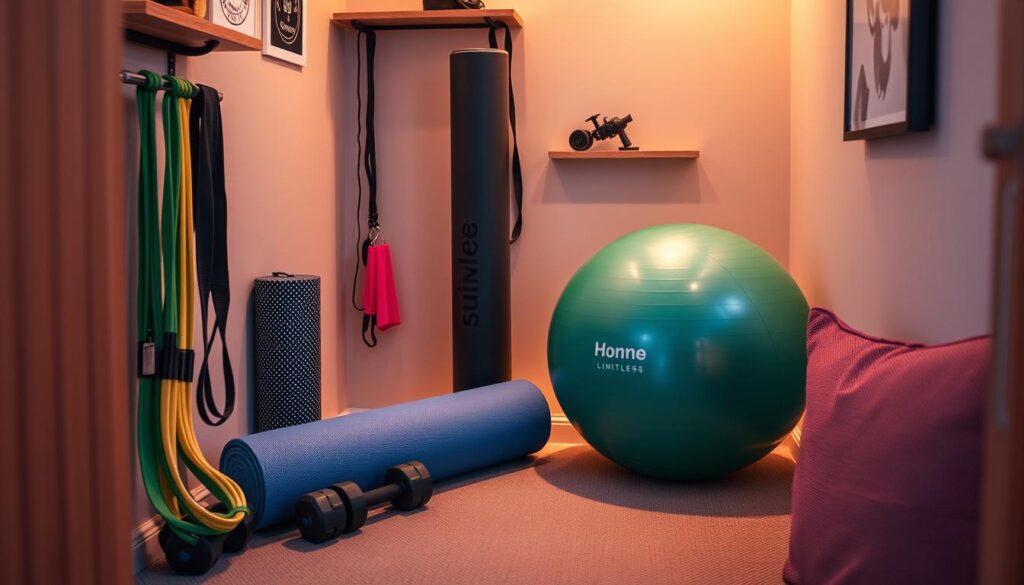
Compact Weights for Strength Training
Dumbbells and kettlebells are vital for building strength. They might cost around $20 each, but they’re worth it. If you’re on a tight budget, try looking at Facebook Marketplace for used ones. This way, you save money without losing quality.
Bodyweight Exercise Tools
Doorway chin-up bars are great for saving space. They cost between $30 and $50. TRX systems are more expensive but offer full-body workouts in small areas. These tools are perfect for mobile homes where space is limited.
| Equipment | Average Cost | Space-Saving Feature |
|---|---|---|
| Resistance Bands | $12+ | Compact, easily stored |
| Dumbbells | $20 per piece | Adjustable options available |
| Doorway Chin-up Bar | $30-$50 | Uses vertical space |
When buying equipment, think about your fitness goals and the space you have. Start with items that can do many things. This way, you get the most out of your mobile home gym.
DIY Mobile Home Gym on a Budget
Setting up a budget-friendly gym in your mobile home is simple. With creativity and items you already have, you can create a great workout space. Even a small area of 50-100 square feet is enough for a home gym setup.
Begin with the essentials. Use water bottles or milk jugs filled with sand as weights. These are affordable and work well. Also, use sturdy chairs for step-ups or dips to add variety to your workouts.
For resistance training, consider these budget-friendly options:
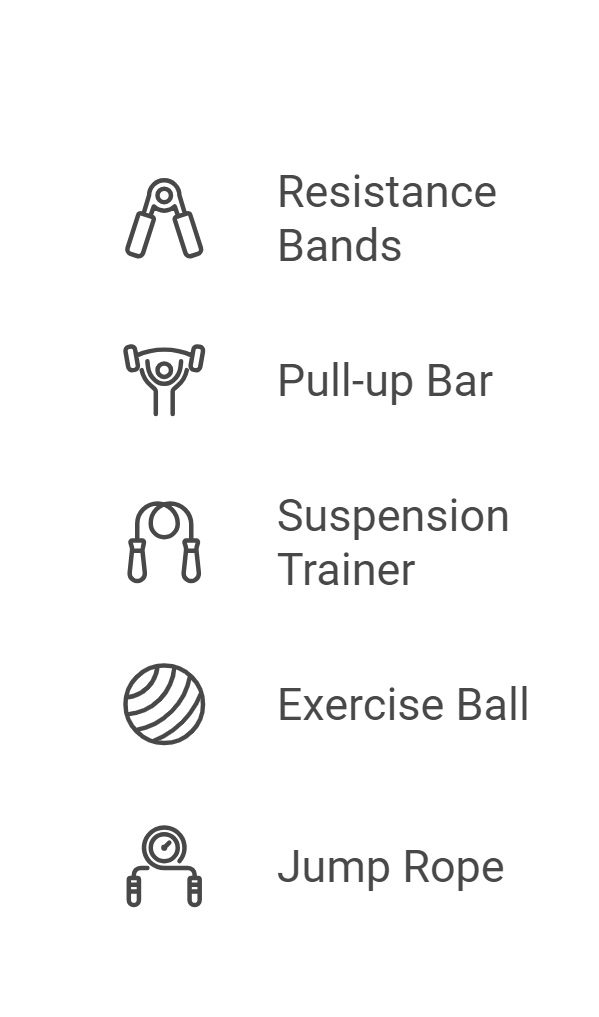
Don’t overlook cardio! Jumping jacks, mountain climbers, and burpees are great without any equipment. For flooring, use interlocking foam mats for cushioning and protection.
Focus on multi-purpose equipment and smart storage to make the most of your space. Starting small is fine. As you get more into fitness, you can add more gear to your collection.
Space-Saving Workout Equipment Options
Fitting a gym into a mobile home needs smart choices in compact exercise equipment. Let’s look at some space-efficient options that are powerful yet don’t take up much room.
Foldable and Adjustable Benches
Foldable fitness gear is a big help for small spaces. Adjustable benches are great for many exercises and can be stored easily. Some models fold flat to fit under a bed or stand upright in a closet.
Wall-Mounted Storage Solutions
Use wall-mounted racks and shelves to make the most of vertical space. These keep your compact exercise equipment organized and easy to reach. Pegboards are perfect for hanging resistance bands, jump ropes, and other light gear.
Multi-functional Fitness Tools
Multifunctional workout tools are the best space-savers. Adjustable dumbbells replace many sets, and suspension trainers offer full-body workouts with just a little equipment.
| Equipment | Price Range | Space-Saving Features | User Rating |
|---|---|---|---|
| Adjustable Dumbbells | $35 – $60 | 10-40 lbs per dumbbell | 4.5/5 |
| WalkingPad Treadmill | $400 – $500 | Folds to 32 inches | 4.5/5 |
| Concept2 RowErg | $900 – $1100 | Splits for storage | 4.8/5 |
| Exercise Ball | $15 – $20 | Deflates for storage | 4.3/5 |
With these space-saving options, you can set up a great home gym in even the smallest mobile home. Pick equipment that fits your fitness goals and space for the best results.
Creating a Functional Workout Area in Limited Space
Making a mobile home gym needs smart planning. Every inch is precious. Begin by setting up efficient workout zones. This way, you use your space well and move easily between exercises.
Vertical storage is essential in tight spaces. Use wall-mounted racks and shelves to keep things off the floor. This frees up space for your workouts. Also, consider foldable gear that can be stored away when not needed.
Multifunctional equipment is a big help in small areas. A single adjustable bench can be used for many exercises. Resistance bands are also great, offering a full workout without taking up much space.
- Use corners for stationary equipment like a compact bike or rowing machine
- Install a pull-up bar in a doorway for bodyweight exercises
- Create a mirror wall to make the space feel larger and check form
Lighting is also very important. Bright, well-placed lights can make your gym feel bigger and welcoming. With these tips, you can turn even the smallest mobile home into a great gym.
Budget-Friendly Flooring Solutions for Your Home Gym
Setting up a home gym doesn’t have to empty your wallet. There are affordable gym flooring options that protect your mobile home’s floor. These solutions are both functional and durable.
Interlocking Foam Mats
Foam tiles are a favorite for home gyms, priced between $0.50 to $2.50 per square foot. They provide cushioning and are simple to install or remove. These mats are lightweight, easy to move, and great for low-impact workouts.
Rubber Mats for Heavy Equipment
Rubber flooring is perfect for areas with heavy equipment. It costs $3 to $8 per square foot and is both durable and shock-absorbent. Rubber tiles are the top choice for home gyms, known for their easy installation. They come in different thicknesses to meet various needs.
DIY Gym Platforms
If you enjoy DIY projects, making your own gym platforms can be both fun and budget-friendly. You can use materials like plywood and recycled rubber to build a strong platform for deadlifting or Olympic lifting. This way, you can design your flooring to fit your workout needs while saving money.
| Flooring Type | Cost per Square Foot | Best For |
|---|---|---|
| Foam Tiles | $0.50 – $2.50 | Low-impact exercises |
| Rubber Mats | $3 – $8 | Heavy equipment areas |
| Vinyl Flooring | $2 – $7 | All-purpose gym use |
The right flooring makes your gym safer and more comfortable without costing a lot. By picking affordable options like foam mats, rubber tiles, or DIY platforms, you can make a great workout space. It will fit your budget and protect your mobile home’s floor.
Incorporating Technology for Guided Workouts
Technology has changed home fitness, making expert guidance easy to get without leaving home. Fitness apps are leading the way, with a market expected to hit $16.6 billion by 2024. They offer many workouts, from strength training to yoga, for all fitness levels.
Online workout programs are also popular, especially since 60% of Americans are canceling gym memberships. These programs give you structured routines and help you track your progress. They also have community features, so you can meet others who love fitness.
Virtual personal training is a top choice for those wanting personalized help. You can get one-on-one training via video calls, getting feedback on your form and technique. This is great for beginners or those with specific fitness goals.
| Fitness Technology | Market Size (2024) | User Penetration |
|---|---|---|
| Fitness Apps | $16.6 billion | 14.82% |
| Online Workout Programs | $6.86 billion | Varies by platform |
| Virtual Personal Training | Part of $14 billion fitness app market (2026) | Growing rapidly |
Using these technologies, you can make a great workout routine in your mobile home gym. Whether you like app workouts, online programs, or virtual training, there’s something for everyone and every budget.
Safety Considerations for Home Workouts
Creating a safe workout space in your mobile home is key for injury prevention. By following a few guidelines, you can enjoy effective workouts safely.
Proper equipment setup and maintenance
Make sure your equipment is set up right and kept in good shape. For example, home pull-up bars can hold about 300 lbs, but some only 200 lbs. If you’re thinking of adding a deck to your mobile, consider an outdoor pull-up bar for more variety. Always check your equipment for wear and tear to keep your gym safe.
Importance of proper form and technique
Learning and practicing the right form is crucial to avoid injuries. Installing a mirror to check your form is a good idea. For planks, aim for proper alignment and start with 30-second holds if you’re new. When doing squats or lunges, keep good posture to protect your knees and back.
Emergency preparedness in a home gym setting
Have a first aid kit and emergency contact info ready in your workout area. Choose the right flooring for your exercises – rubber mats for heavy lifting, foam mats for lighter ones. Taking these precautions will make your home gym safer for reaching your fitness goals.

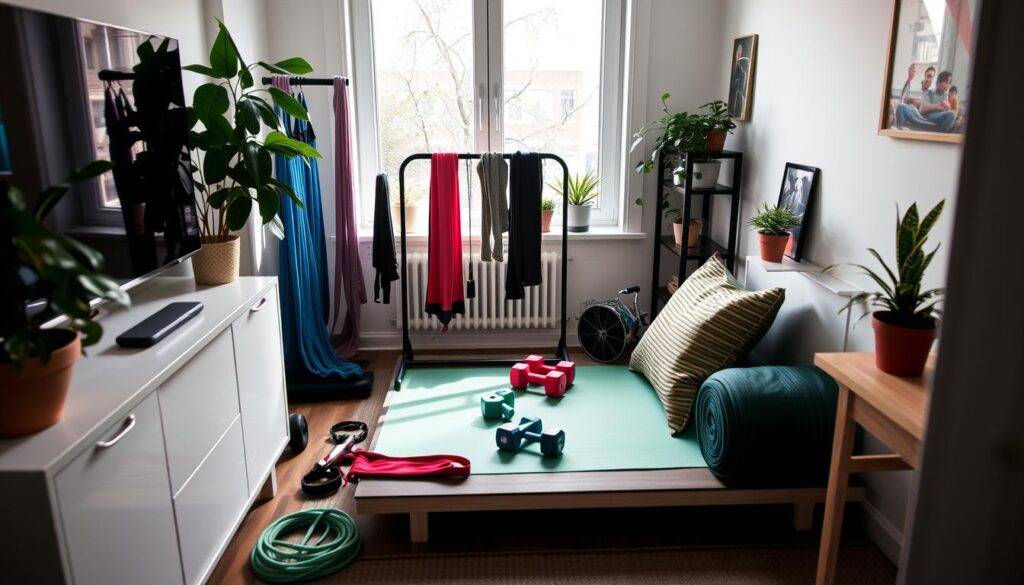

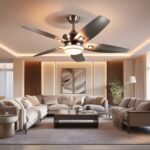


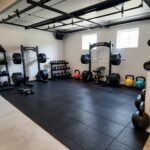
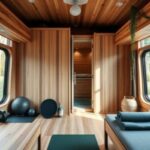
1 thought on “DIY Mobile Home Gym| Affordable Fitness Solutions for Small Spaces”